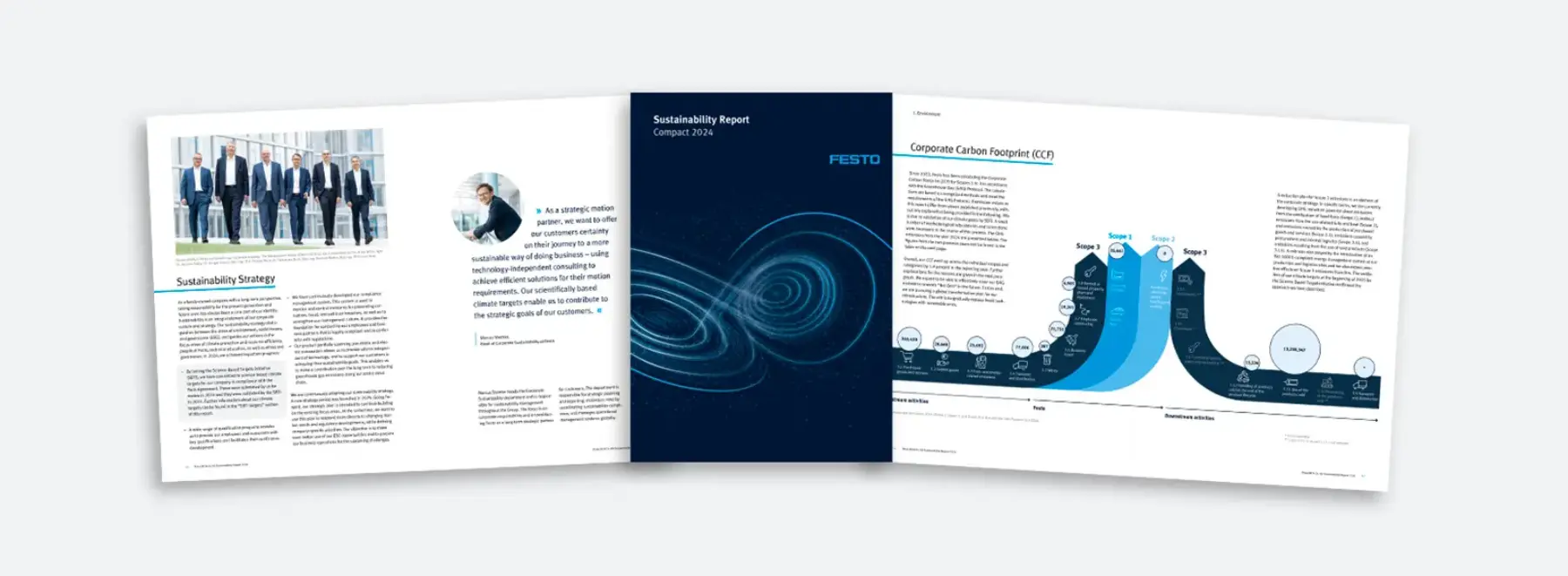We want to contribute to achieving the 17 Sustainable Development Goals (SDGs) of the United Nations (UN) by taking the right course of action. These were adopted by the UN General Assembly in autumn 2015 and are the centerpiece of the 2030 Agenda – a global action plan that aims to tackle current challenges as well as protect our planet, while making economic progress environmentally sound and socially equitable.

“As a strategic motion partner, we want to offer our customers security on their way to a more sustainable way of doing business – with open-technology consulting to efficiently solve their motion requirements.
With our scientifically sound climate targets, we contribute to the strategic goals of our customers.”
Marcus Stemler, Head of Corporate Sustainability at Festo
Science-based climate targets
As part of Festo's global sustainability strategy, consistently avoiding or reducing greenhouse gas emissions (GHG emissions) is a top priority. We have set ourselves ambitious, science-based climate targets to limit global warming to 1.5 °C compared to pre-industrial levels. These targets were officially validated by the Science Based Targets initiative (SBTi) in February 2025. The SBTi is an independent initiative that examines reduction targets based on climate science findings.
As an overarching "net zero" target, we are committed to absorbing as much greenhouse gas along the value chain (Scopes 1-3) by 2050 as we release.
As short-term targets, we are committed to reducing absolute GHG emissions in Scopes 1 and 2 by 64.3 percent by 2030 compared to the base year of 2022. We want to reduce absolute GHG emissions in Scope 3 by 25 percent in the same period.
In the long term, we are committed to reducing absolute GHG emissions in Scopes 1 and 2 by 90 percent by 2040 compared to the base year of 2022. We want to reduce absolute GHG emissions in Scope 3 by 90 percent by 2050 compared to the base year of 2022.
In order to achieve our targets for Scopes 1 and 2, we are implementing a global infrastructure plan and pursuing a global green electricity strategy. We are also continuing to invest in energy efficiency measures and the further expansion of photovoltaics (PV).
To reduce GHG emissions in the value chain (Scope 3), we are focusing on the shortest possible supply chains with increasing regionalization, namely "local for local". With regard to products, we consider sustainability aspects in the product development process right from the start in order to optimize our carbon footprint in production, and energy consumption in the product use phase.
Our Sustainability Report 2024
Festo is a product of many hands created over generations. We shape our future through our financial independence as a family-owned company. That is our mission. In doing so, we involve all our stakeholders – customers, employees, suppliers, and society – in the collective and sustainable creation of value. With our expertise in automation and technical education, we increase our customers’ productivity and create opportunities for sustainable economic, environmental, and social development. That is our pledge.
Our global responsibility is documented in our Sustainability Report 2024 using examples from the year 2024.
The areas of action defined in our sustainability strategy
In March 2020, our Management Board adopted the sustainability strategy, which has been subject to regular updates ever since. The sustainability strategy is currently being even more closely tied to the corporate strategy.
An important decision that we took in 2023 was to combine the topics of energy efficiency and climate protection across the entire supply chain into one area of action that is now managed as a cohesive whole. This has led to the areas of action in the sustainability strategy being consolidated from five to four.
In identifying the key topics and developing associated areas of action, the results of a stakeholder analysis were used and supplemented with observations of external changes in the fields of legislation, business and politics, technology, energy, the environment and society. On this basis, we regularly review our strategic focus and also our sustainability goals and measures.
Partner of the Blue Competence initiative
We are a partner of the Blue Competence sustainability initiative. Blue Competence is an initiative of the German Mechanical Engineering Industry Association (VDMA) to promote sustainability in the mechanical engineering sector and also to foster sustainable solutions throughout industry. Through our partnership, we are committed to complying with the 12 sustainability principles of the mechanical and plant engineering industry.
The sustainable guidelines for the mechanical and plant engineering industry (PDF)
